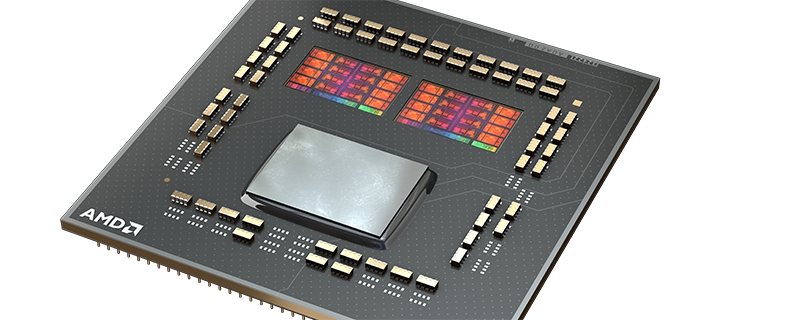AMD Ryzen 9 5900X and Ryzen 9 5950X Review
Conclusion
Are you okay, AMD? Because we honestly thought you’d squeezed all the juice there was to squeeze from your Ryzen cores on 7nm? For many workloads, the Ryzen 9 3900X and Ryzen 9 3950X are both absolute triumphs of their craft; and yet, here we are again, with another new set of CPUs that once again move the goalposts. It’s okay to take a breather now and again.
The big shift with the new Zen 3 architecture that underpins the Ryzen 4th Generation (5000 series) CPUs is the move from multiple Core Complexes (CCXs) per die where CPUs contained multiple quad-core modules. These complexes were all tied together within dual CCX Compute Dies (CCDs) to give their Ryzen CPUs their total core count.
Now with Zen 3, the Ryzen 5000 series has a unified design with just CCDs which contain single 8 core/16 thread CCXs, as we showed you on the second page. The end result is the important thing, and even a cursory glance at our results show how much of an improvement AMD has made in a relatively short period of time.
Amongst other changes, AMD’s radically altered CCD/CCX designs allow Zen 3/Ryzen 5000 to deliver each of their CPU cores access to larger/merged L3 cache pools and reduces the core-to-core communications speeds of CPUs cores within the same compute die. When combined with other changes like Zen 3’s enhanced cache prefetching, execution engines, branch predictors, and micro-op cache, Zen 3 can deliver user staggering performance improvements over Zen 2, and transformative improvements over Zen/Zen+. Â
We don’t like cherry-picking examples because everyone has different needs, but we’ll give you one example that might make things clear for those of you who’ve skipped straight to the conclusion like cowards. The Ryzen 9 5950X is a 16C/32T CPU that runs CineBench R20 at stock as quickly as the 32C64T Ryzen Threadripper 2990WX did. In 2 years they’ve doubled the relative core performance. Somewhere Gordon Moore is punching the air in delight. If you prefer your comparisons more Intel-based, then the Ryzen 9 5950X is just behind the Intel Core i9-10980XE in our 4K Blender test and just ahead in the 1080P version of that same test. The Intel, for comparison, has two extra cores and costs £200 more. Yeah, exactly.
We could go on about the multicore performance of AMD’s Ryzen 9 5950X and 5900X at length, but we don’t believe there is much to add to the dominating performance you saw throughout our graphs today. So instead of rambling on let’s zero in on a couple of things that make the 5000 series Ryzen CPUs a worthy purchase for end users. Firstly the updated PBO technology is an absolute hoot. We’ve often mentioned how modern automatic overclocking systems have narrowed the gap between a stock CPU and a manual overclock considerably in recent years. Heck, when we began this site, your choice was stock or overclock, and that was that. However, this latest generation of AMD processors shows that there is almost nothing to be gained by manual overclocking for the average user with off-the-shelf CPU cooling. Clearly, you can squeeze a little more if you want, but just turning on PBO with a decent AIO is enough to give you all the performance with none of the faffs of manual overclocking.
Secondly, the single-threaded performance was, for a time, the weakness of AMD CPUs. The first Ryzen CPUs fell down our graphs in gaming benchmarks when compared to their Intel rivals because of this. That was largely rectified in the 2nd generation of Ryzen processors (thanks to clock speed boosts and cache latency reductions), and eliminated almost entirely with AMD’s 3rd Generation of Ryzen processors. AMD clearly are averse to laurel resting though as the two CPUs we have on test today are miles ahead of their Intel counterparts in several regards. Both the Ryzen 9 5900X and Ryzen 9 5950X break through the 600 point barrier in single-threaded CineBench R20 benchmarks with the PBO enabled 5950X hitting 635. The next best after them is the Ryzen 9 3900XT at 545 with the Intel Core i9-10900K coming in at 544. If that doesn’t seem like a massive leap forwards then it’s worth bearing in mind the 2nd Generation Ryzen was in the 430 brackets. So 100 extra points from the most recent CPUs and another 100 on top of that from today’s 5000 series. Given that a huge amount of those tiny applications that constantly run in the background of your system, and plenty of games, love a single thread that’s only going to be beneficial in every aspect of your daily use.
When it comes to gaming, our testing has been limited, thanks mostly to our revamped CPU games testing suite. We chose to test titles which we have benchmarked previously for graphics card reviews and found to become CPU-limited with today’s high-end graphics cards at 1080p. In titles like Total War Warhammer 2, Far Cry 5 and Shadow of the Tomb Raider, AMD’s latest Ryzen processors easily surpass the performance of their Ryzen 3000 series counterparts and have become head-to-head competitors with Intel’s highest performance models. Had we tested more games, we are sure that AMD and Intel would have traded blows, but with the Ryzen 5000 series, it can no longer be claimed that AMD is behind Intel within gaming workloads. Â
It’s tough not to have your head turned by the ludicrous performance the Ryzen 9 5950X has, but the Ryzen 9 5900X is no slouch either. Both hit the price and performance sweet spot even if you have to make investing in an AM4 motherboard into account. If you don’t need the extra cores of the Ryzen 9 5950X the price difference is enough that you should definitely give the Ryzen 9 5900X a long hard look. Both of these models are stunning CPUs, and a big announcement from AMD that they’re not just catching up with or shoulder to shoulder with Intel, but disappearing over the horizon into the sunset. On which metaphorical bookend we’ll stop rambling and let you check your local retailer for stock.
In an uncertain world, the AMD Ryzen range has become a touchstone of excellence, and long may it continue.
The Ryzen 9 5950X has an MSRP of £799 whilst the Ryzen 9 5900X has an MSRP of £550.
Discuss the AMD Ryzen 9 5900X and Ryzen 9 5950X in our OC3D Forums.




